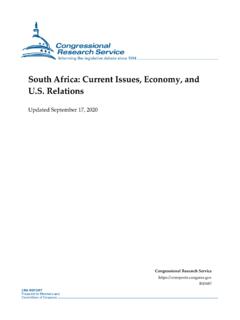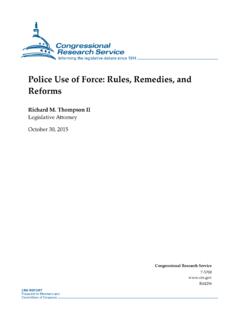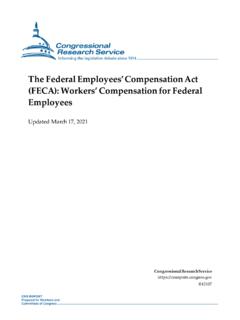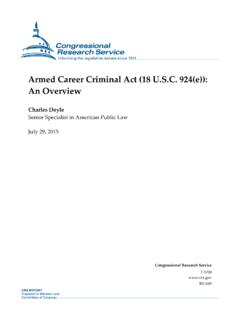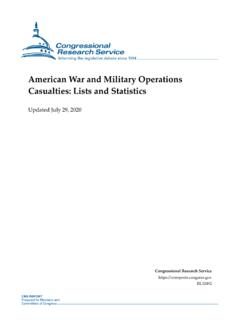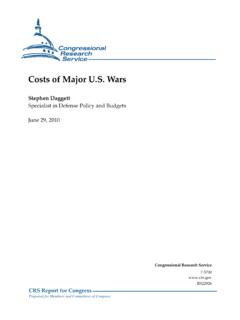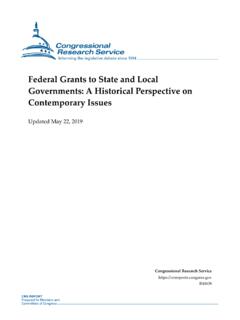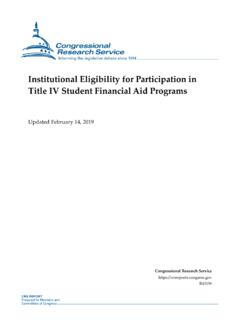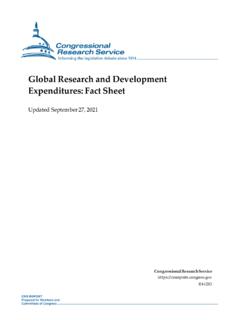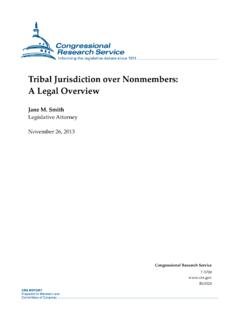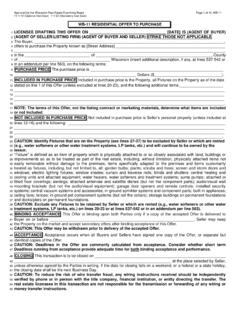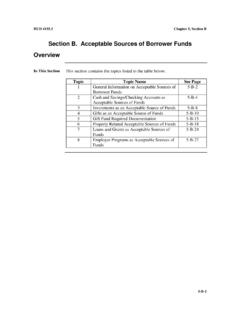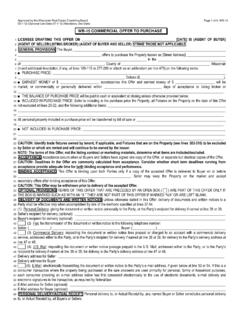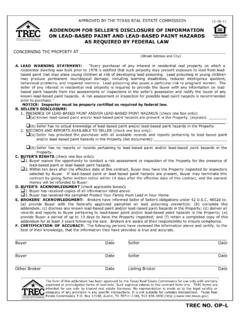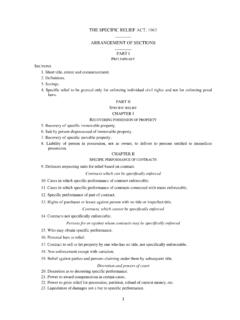Transcription of The Controlled Substances Act (CSA): A Legal Overview for ...
1 The Controlled Substances Act (CSA): A Legal Overview for the 117th Congress Updated February 5, 2021 Congressional Research Service R45948 Congressional Research Service SUMMARY The Controlled Substances Act (CSA): A Legal Overview for the 117th Congress The Controlled Substances Act (CSA) establishes a unified Legal framework to regulate certain drugs that are deemed to pose a risk of abuse and dependence. The CSA may apply to drugs that are medical or recreational, legally or illicitly distributed, but the statute does not apply to all drugs. Rather, it applies to specific Substances and categories of Substances that have been designated for control by Congress or through administrative proceedings.
2 The CSA also applies to Controlled substance analogues that are intended to mimic the effects of Controlled Substances and to certain precursor chemicals commonly used in the manufacturing of Controlled Substances . Controlled Substances subject to the CSA are divided into categories known as Schedules I through V based on their medical utility and their potential for abuse and dependence. Substances considered to pose the greatest risk to the public health and safety are subject to the most stringent controls and sanctions. A lower schedule number corresponds to greater restrictions, so Substances in Schedule I are subject to the strictest controls, while Substances in Schedule V are subject to the least strict.
3 Many Substances regulated under the CSA are also subject to other federal or state regulations, including the Federal Food, Drug, and Cosmetic Act (FD&C Act). The Drug Enforcement Administration (DEA) is the federal agency primarily responsible for implementing and enforcing the CSA. DEA may designate a substance for control through notice-and-comment rulemaking if the substance satisfies the applicable statutory criteria. The agency may also place a substance under temporary control on an emergency basis if the substance poses an imminent hazard to public safety. In addition, DEA may designate a substance for control if required by the United States international treaty obligations.
4 In the alternative, Congress may place a substance under control by statute. The CSA simultaneously aims to ensure that patients have access to pharmaceutical Controlled Substances for legitimate medical purposes while also seeking to protect public health from the dangers of Controlled Substances diverted into or produced for the illicit market. To accomplish those two goals, the statute creates two overlapping Legal schemes. Registration provisions require entities working with Controlled Substances to register with DEA and take various steps to prevent diversion and misuse of Controlled Substances . Trafficking provisions establish penalties for the production, distribution, and possession of Controlled Substances outside the legitimate scope of the registration system.
5 DEA is primarily responsible for enforcing the CSA s registration provisions and works with the Criminal Division of the Department of Justice to enforce the Act s trafficking provisions. Violations of the registration provisions generally are not criminal offenses, but certain serious violations may result in criminal prosecutions, fines, and even short prison sentences. Violations of the trafficking provisions are criminal offenses that may result in large fines and lengthy prison sentences. Drug regulation has received significant attention from Congress in recent years, with a number of bills introduced in the 116th Congress to amend the CSA in various ways.
6 For example, the 116th Congress considered multiple proposals aimed at addressing the opioid crisis, including the John S. McCain Opioid Addiction Prevention Act ( 1614, S. 724), which would have limited practitioners ability to prescribe opioids; the LABEL Opioids Act ( 2732, S. 1449), which would have required prescription opioids to bear certain warning labels; and the Ending the Fentanyl Crisis Act of 2019 (S. 1724), which would have increased criminal liability for illicit trafficking in the powerful opioid fentanyl. The 116th Congress also enacted the Temporary Reauthorization and Study of the Emergency Scheduling of Fentanyl Analogues Act ( 116-114), which placed a broad class of fentanyl analogues in Schedule I on a temporary basis, and considered other measures specifically seeking to address the proliferation of synthetic drugs that mimic the effects of fentanyl.
7 In addition, multiple recent proposals sought to address the divergence between federal and state marijuana laws. The MORE Act of 2019 ( 3884, S. 2227), which passed the House in December 2020, would have removed marijuana from the schedules of Controlled Substances . Other recent legislative proposals sought to facilitate clinical research involving marijuana and other Schedule I Controlled Substances . In addition, the emergence of the Coronavirus Disease 2019 (COVID-19) pandemic in 2020 raised Legal issues under the CSA, including questions around the availability of Controlled Substances used in treating COVID-19 and medical practitioners ability to prescribe Controlled Substances via telemedicine.
8 The various proposals introduced in the 116th Congress raise a number of Legal questions that Congress may contemplate when deciding whether to change the laws governing Controlled Substances . R45948 February 5, 2021 Joanna R. Lampe Legislative Attorney The Controlled Substances Act (CSA): A Legal Overview for the 117th Congress Congressional Research Service Contents Background and Scope of the CSA .. 1 Other Regulatory Schemes .. 3 Classification of Controlled Substances .. 5 Overview of Schedules .. 5 Analogues and Listed 7 Scheduling Procedures .. 8 Legislative Scheduling .. 8 Administrative 9 Emergency 10 International Treaty 11 Registration 12 Entities Required to Register.
9 12 Obligations of Registrants .. 14 Recordkeeping and Reporting .. 14 Inspections .. 14 Security .. 15 Quotas .. 15 16 Enforcement and Penalties .. 16 Trafficking 17 Prohibitions .. 17 Enforcement and Penalties .. 18 Legal Considerations for the 117th Congress .. 20 Opioid Crisis .. 20 Analogue 23 Marijuana Policy 25 Clinical Research and Use of Schedule I Substances .. 31 COVID-19 Pandemic .. 34 Supply of Controlled Substances .. 34 Telehealth Services .. 35 Figures Figure 1. CSA Scheduling Criteria .. 6 Contacts Author Information .. 37 The Controlled Substances Act (CSA): A Legal Overview for the 117th Congress Congressional Research Service 1 rescription drugs play a vital role in American public health.
10 The Centers for Disease Control and Prevention (CDC) estimates that during 2015 and 2016 over 45% of Americans had used one or more prescription drugs in the last 30 But unfettered access to drugs may pose serious public health risks. The CDC reports that in 2018 over 67,000 Americans died of overdoses of prescription and nonprescription The Controlled Substances Act3 (CSA or the Act) seeks to balance those competing The CSA regulates Controlled Substances prescription and nonprescription drugs and other Substances that are deemed to pose a risk of abuse and By establishing rules for the proper handling of Controlled substances6 and imposing penalties for any illicit production, distribution, or possession of such Substances ,7 the Act seeks to protect the public health from the dangers of Controlled Substances while also ensuring that patients have access to pharmaceutical Controlled Substances for legitimate medical This report provides an Overview of the CSA and select Legal issues that have arisen under the Act.
